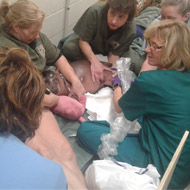
Premature Fiona is starting to show signs of recovery
A hippo that was born six-weeks premature has received life-saving treatment from doctors at a nearby children’s hospital.
Vets at Cincinnati Zoo reached out to Cincinnati Children’s Hospital after baby Fiona became dehydrated and in need of IV fluids. Like a good neighbour, the Vascular Access Team (VAT) rushed over to help and inserted an IV catheter.
“Preemies have very tiny and unstable veins, and even though our vet team was able to get multiple IVs placed, the veins could not sustain the IV and would blow,” said curator of mammals Christina Grouch.
“Lucky for us, we’re right next door to a world-class facility with a whole department dedicated to working with difficult veins.”
Two VAT members arrived at the zoo equipped with sensitive ultrasound equipment and placed the catheter in Fiona. The first IV took around 30 minutes and then the vein blew.
Not giving up, the team gave it another try and placed an IV catheter in one of Fiona’s deep leg veins. Since the doctors inserted the IV, zoo vets have been working around the clock to monitor the baby hippo.
“Five bags of fluid later, Fiona is showing signs of recovery,” said Grouch. “She is still sleeping a lot but has started taking bottles again and has periods of carefully-supervised activity. The catheter is still in place.”
This is not the first time an animal at Cincinnati Zoo has been cared for by doctors at the children’s hospital. in 2015, an aardvark was transported to Cincinnati Children’s for CT and MRI scans to get a closer look at what might be causing persistent ocular drainage.
The centres have also consulted on baby gorillas and polar bear pregnancy tests. But say that a premature hippo is a first for everyone.
“We are happy to extend our expertise to our neighbours at the Cincinnati Zoo. Like many people, we are rooting for Fiona!” said VAT clinical director, Sylvia Rineair.
Image (C) Cincinnati Zoo



 The veterinary mental health charity Vetlife is inviting the veterinary community to join it for a sponsored cold-water dip.
The veterinary mental health charity Vetlife is inviting the veterinary community to join it for a sponsored cold-water dip.